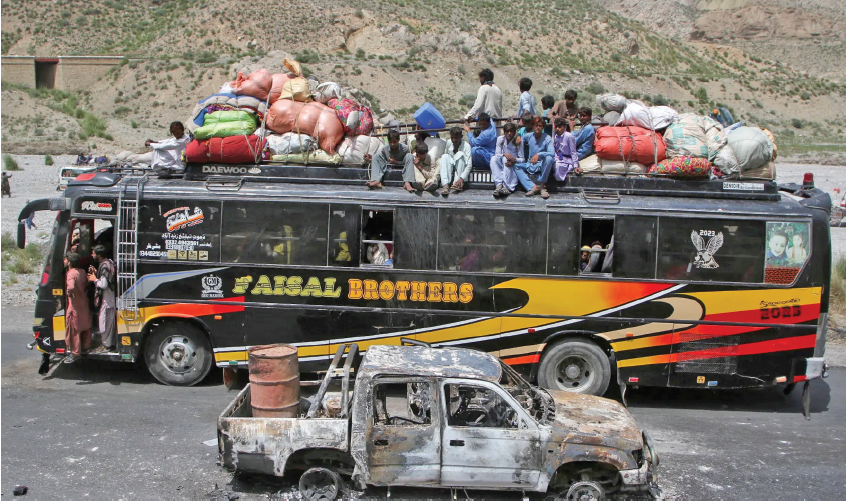Shaal (Quetta), the capital of Baluchistan Province in Pakistan, is a multicultural city where people of various cultures and ethnicities have lived together peacefully for many years. It has a rich history with no significant racial or sectarian biases until 1990s. It has been home to ancient civilizations, such as Mehrgarh civilization, one of the oldest in the region.
Additionally, Baluchistan itself holds great importance in terms of socio-political and economic aspects, with its strategic location along coastal areas and its significance in trade, natural resources and beauty. However, behind its beautiful scenery and lively traditions, there is a story of hardship and struggle that prevent its people from exercising their basic rights along with the delay in development. Baluchistan is Pakistan’s largest province making up around 45 per cent of the country’s total area and possibly the country’s most turbulent and violent region in terms of peace and security.
It is a vital economic and geostrategic location. Since Baluchistan joined Pakistan in 1947, the issues started. Throughout history, the province has experienced disturbances, bombings, suicide attacks, and insurgencies. For Pakistan, Baluchistan occupies a crucial strategic and economic position. It generates 36 per cent of Pakistan’s gas production as well as a sizable amount of the country’s mineral and energy resources like uranium, platinum, silver, copper, gold, coal, and silver. Some of the political activists, say that if Baluchistan’s resources are effectively utilised, Dubai will fail. It is a security state that has security-centric, militarisation policies.
Political repression and enforced disappearances are among the most pressing issues in Quetta, Baluchistan. Activists, journalists, students, and ordinary people are frequently abducted by state security forces for various accusations. Their families, especially women, are continuously protesting from the past many years all across Baluchistan for their missing loved ones. Months before, a group of those families marched to the capital, Islamabad, to demand answers for their missing family members. According to Dr. Maharang Baloch, the leader of the Long March, they were disappointed by the government’s response.
The Baloch Yakjehti Committee (BYC) coordinated huge protests across Baluchistan, notably in Quetta, in February 2025. Families of missing people and civil society representatives gathered to protest enforced disappearances and extrajudicial killings. Protesters brought images of their loved ones and yelled slogans calling for justice and international involvement. BYC leaders accused Pakistan of using enforced disappearances and targeted assassinations to suppress Baloch youth, students, and intellectuals.
On the one hand, we see on social media that armed militants intercepted passenger buses in Rakhni, Baluchistan, killing seven passengers from Punjab province in February 2025, and on the other, we see government officials stopping Baloch students from installing book stalls in their areas and not allowing students to take or place books in libraries in Turbat.
We also notice on social media that uniformed men are brutally entering Baloch neighbourhoods and capturing youth or male members. This has created an alarming environment in the city which needs to be resolved as it is the main issue of Baluchistan that causes other war politics in the region, including the persecution of the Hazara community. When the Baluchistan issue arises, other minority ethnic groups, such as the Hazara, become scapegoats to shift attention away from the underlying concerns in Baluchistan.
The Hazara community in Quetta has faced severe persecution for over two decades in the name of sectarian and ethnic conflicts. Individuals, professionals, politicians, and business people continue to be targeted and killed by unidentified assailants. The authorities’ failure to catch the attackers shows they are either incompetent, indifferent, or may be involved in the attacks. The basic issue for the Hazara community is the right to live, which has not been protected in Pakistan throughout years. The male population within Hazara households has diminished, with many men being killed, others leaving Pakistan, and many showing signs of psychological distress. Young people are involved in drugs, facing financial crises, and experiencing social alienation. A study by Zara Arshad and Madiha Batool found that 68.2 per cent of Hazara affected by terrorism in Quetta, Pakistan, suffer from Post-Traumatic Stress Disorder (PTSD).
Nader Ali Hazara reports that 2,500 people have been killed, while Reza Wakil, a human rights activist for Hazara and refugees in Baluchistan, mentions that 3,000 people have been killed and more than 3,000 injured. Although the number of attacks and target killings has decreased in the past two years, but one can still not say it is long-lasting peace for the Hazara community. The violence against Hazara in Quetta is clearly an act of genocide and systemic ethnic cleansing in both Pakistan and Afghanistan. On the other hand, injustice often stems from poor governance and ineffective leadership, leading to problems like limited access to education, basic facilities like water, electricity and gas, healthcare crises, and environmental degradation. A clear example of poor governance is the continuous difficulty faced by the Hazara community in Quetta when trying to obtain essential legal documents like ID cards, passports, and local certificates. These documents are crucial for accessing services, education, and health and job opportunities. However, many Hazaras face delay, discrimination, and unnecessary bureaucratic verifications during the application process.
These different injustices have been taking place in Baluchistan for a long time which need urgent attention because they violate the human rights of both groups. Quetta faces significant challenges, including political repression, enforced disappearances, and systemic ethnic cleansing. The situation is unstable, with the Hazara community struggling for their basic rights, safety and identity. In addition, poor governance and ineffective leadership contribute to issues like lack of access to education, essential services, healthcare, and environmental degradation. Addressing these challenges is crucial for ensuring justice, peace, and development of the broader region of Baluchistan.
The writer is MPhil student of International Relations, working as a research assistant. She hails from Quetta, Baluchistan.



